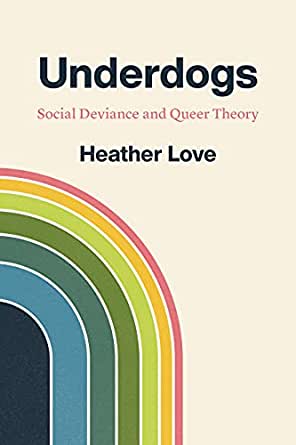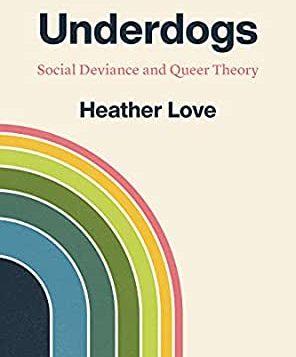 UNDERDOGS
UNDERDOGS
Social Deviance and Queer Theory
by Heather Love
University of Chicago Press. 238 pages, $26.
IN 2009, Heather Love’s first book Feeling Backward: Loss and the Politics of Queer History established her as a soft-spoken rock star in the world of Queer Theory. Why, then, in a panel discussion uploaded to YouTube from 2016, did she attest that she was in the middle of a “personal crisis in the humanities”? She expressed impatience with the limits of her academic training and wanted to test its assumptions. That prompted her to ask a question that’s usually lobbed by skeptics: “What is Queer Theory about?” Her answer can be found in a new book, Underdogs: Social Deviance and Queer Theory.
Queer Theory as an academic discipline emerged in the early 1990s after French theorists such as Michel Foucault and Jacques Derrida were translated into English. These books’ arrival coincided with a groundswell of gay activism during the AIDS crisis. Wanting to push beyond mainstream appeals for LGBT rights, queer scholars such as Judith Butler, Eve Kosofsky Sedgwick, and Michael Warner formulated more radical critiques that could not be as easily incorporated into electoral politics. Among the field’s enduring—and still controversial—ideas, is theorizing gender as performance rather than as a manifestation of someone’s interior truth, analyzing the ways in which “coming out” deepens the (fictional) homo-hetero binary, and examining how the state affords power to some individuals through normative categories such as marriage.
Underdogs seeks to rethink Queer Theory’s ideological contributions through an excavation of the field’s unacknowledged predecessors in the postwar social sciences. From the 1950s to the ’70s, sociologists conducted empirical research involving not only homosexuals but marginal peoples of all stripes, including potheads, con men, and circus performers. The scholars dubbed their exploration of social outcasts “Deviance Studies.” The cringe-worthy moniker belies the discipline’s forward-thinking theses, which, in Love’s words, “reframed deviance as a relational dynamic rather than as a set of inherent traits.” For these sociologists, identities are not innately inborn but result from social expectations (often expressed as labels) and everyday personal interaction. Love sees the work of these midcentury academics as still relevant, not only because they challenge us to confront contemporary forms of “social denigration,” but also because their findings predate by decades similar ideas promoted by Queer Theory. While few Deviance Studies practitioners were themselves homosexual, this fact should not in Love’s view disqualify their research, including their vast archive of the “material and social specificity” of pre-Stonewall queer lives.
Underdogs’ first chapter focuses on the work of sociologist Erving Goffman, who—despite being one of the most widely cited scholars of all time, famous for works such as The Presentation of Self in Everyday Life (1956) and Stigma: Notes on the Management of Spoiled Identity (1963)—remains an enigma. Goffman is a formidable sparring partner. His books stack impenetrable layer upon layer, as social expectations and individual performances bounce back and forth to produce a “definition of the situation” that governs a given social interaction. But Goffman’s often startling conclusions about relations in public were contradicted by his own highly introverted, “pencil-pusher” persona. Shunning interviews, Goffman, like a Pinkerton gumshoe, didn’t leave a trace.
This elusiveness extended to his work, and watching Love try to pin him down makes for an exciting reading experience. Goffman viewed “human action as a set of empirically observable performances, rather than as the disclosure of an essence.” For Goffman, there was no authentic self hidden inside an individual’s interiority. For Love, this deflated view of human identity deflected the moralistic psychologizing of the socially marginal, turning deviance into just another slice of human behavior rather than the manifestation of a psychic flaw. Goffman’s work is often seen as apolitical, but Love shows how the quotidian interactions of small groups recapitulate the larger social forces that control these exchanges. This sure sounds like Queer Theory’s notions about how the hegemonic culture polices social behavior by constructing the parameters in which it takes place. And yet, argues Love, Goffman is rarely cited as a precursor to Foucault.
The book’s subsequent chapters tackle topics as varied as ethology and animal observation, sociologists Laud Humphreys and Evelyn Hooker, the nonfiction writings of Samuel Delany, and current debates in Queer Theory regarding normativity. While they lack the verve of her investigation of Goffman, Love frequently demonstrates an ability to think through the practical implications of high-flown theories. Her lucid prose and well-grounded interpretations make Underdogs a book that should interest readers who are immersed in Queer Theory and those who are not at all. Those who dislike Queer Theory can perhaps take some satisfaction in the claim that their arguments really aren’t all that original. ____________________________________________________________
Michael Civello is a PhD candidate in theater at the U. of Illinois.





